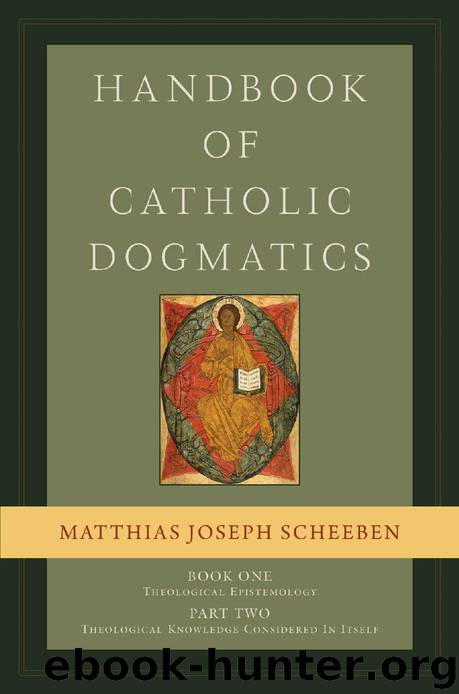Handbook of Catholic Dogmatics 1.2 by Matthias Joseph Scheeben

Author:Matthias Joseph Scheeben [Scheeben, Matthias Joseph]
Language: eng
Format: epub
Publisher: Emmaus Academic
Published: 2020-01-06T16:00:00+00:00
§49. The product of the union of understanding with faith: theological science as a scientific development of faith knowledge, or as a real science of faith and speculative theology
{907} I. The essence and nature of theological science in general. Immediately and at first the understanding of the objects of faith has the purpose and the effect of making them present to faith, giving it a more or less clearly conscious content, and thus making faith itself a true, clear, and thorough kind of knowledge. Furthermore, though, it has at the same time the purpose and the effect of producing from faith a further knowledge that is indeed rooted in it, communicated by it, and derived from it, but not formally identical with it, which has its own certainty related to but not completely similar to the certainty of faith.
{908} That is to say, because the correct understanding of the content of faith also makes possible the insight into the connection of the individual truths with one another, therefore from the articles of faith can be derived, just as well as from evident truths of reason, other propositions that are necessarily connected with them or traced back to them, and consequently the articles of faith are utilized as axioms or principles for a more or less large series of corollaries or conclusions; in this capacity the articles of faith are then called rationes theologicae, so as to contrast them with the rationes naturales or humanae, as we call the evident principles of reason. The difference between the knowledge of the corollaries as such and that of the axioms consists accordingly in the realm of faith, in much the same way as in the realm of natural thought, in the fact that the former is a mediate knowledge, while the latter is immediate. However, while in the realm of natural thought the certainty of the corollaries proceeds only from an extension of that insight by dint of which one adheres to the axioms, and hence is not of an essentially different kind than the certainty of the axioms, in the realm of faith the certainty of the corollaries proceeds from the combination of two dissimilar factors, faith and insight; consequently it is essentially different from the certainty of its principles and more imperfect than they are, and in this capacity it is called theological certainty in the narrower sense. Nevertheless, insofar as knowledge of the corollaries, proceeding as it does from faith in the axioms, extends and develops the knowledge contained in them, it is also in turn a development of faith knowledge.
{909} Now just as in the natural realm precisely the knowledge of the corollaries as such is called science [Wissen oder Wissenschaft] = scientia in the narrower sense, in contrast to the knowledge of the axioms that is based on immediate insight (intellectus), so too in the realm of faith the knowledge of the corollaries is likewise called science in the narrower sense, in contrast to the knowledge of the axioms that is based here on immediate faith.
Download
This site does not store any files on its server. We only index and link to content provided by other sites. Please contact the content providers to delete copyright contents if any and email us, we'll remove relevant links or contents immediately.
The Lost Art of Listening by Michael P. Nichols(6503)
Why I Am Not A Calvinist by Dr. Peter S. Ruckman(3780)
The Rosicrucians by Christopher McIntosh(3068)
Wicca: a guide for the solitary practitioner by Scott Cunningham(2714)
Signature in the Cell: DNA and the Evidence for Intelligent Design by Stephen C. Meyer(2513)
Real Sex by Lauren F. Winner(2496)
The Holy Spirit by Billy Graham(2440)
To Light a Sacred Flame by Silver RavenWolf(2366)
The End of Faith by Sam Harris(2306)
The Gnostic Gospels by Pagels Elaine(2047)
Nine Parts of Desire by Geraldine Brooks(2014)
Waking Up by Sam Harris(1970)
Heavens on Earth by Michael Shermer(1963)
Devil, The by Almond Philip C(1913)
Jesus by Paul Johnson(1900)
The God delusion by Richard Dawkins(1863)
Kundalini by Gopi Krishna(1833)
Chosen by God by R. C. Sproul(1776)
The Nature of Consciousness by Rupert Spira(1699)
